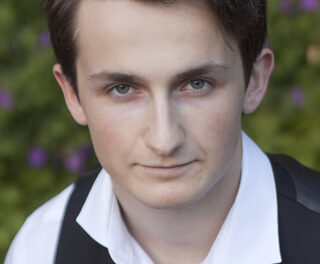Vincent L. Povázsay makes tracks to Northwestern for grad school in the fall. At UNC, he’s studied with Tonu Kalam, who thinks enough of his apprentice to have played the solo part in Bach’s Keyboard Concerto in F Minor, S.1056, at the younger man’s last concert with the orchestra he founded two years ago – called the UNC Lab Orchestra – so he’d have something to conduct. Sunday evenings on beautiful weekends that are already packed with lots of things to do, musical and otherwise, are often graveyard shifts, but Povázsay and his colleagues – 27 players or so – drew a respectable crowd for a program of music by Ash Stemke, Berlioz, that aforementioned concerto, Stravinsky, and – as it happened – J. Strauss II as arranged by Schoenberg. One could argue that we have plenty enough orchestras here, variously populated by students (of all ages), amateurs, and professionals, but opportunities to perform still seem limited in certain quarters, and it’s a fact that beginning conductors are especially hard-pressed to get experience waving sticks at anything other than mirrors. As it happened, this little chamber orchestra played remarkably well and with spirit and enthusiasm, and Povázsay did well in front of them, eliciting mostly unified responses with far greater physical restraint than one might have anticipated, under the circumstances. The orchestra was seated in a way virtually guaranteed to ensure success in terms of clarity and definition: the violins were divided, with the cellos (and the one double bass) tucked in behind the firsts and the violas, behind the seconds. There was no readily-apparent weakness in the seconds, so this was a happier layout than is sometimes the case.
The opening work was a premiere by the ensemble’s principal violist. Ash Stemke has produced a very attractive seven-minute essay for strings called “Over the Wing” that begins with a lot of energy and excitement and manages to sustain both plus considerable listener interest for its duration. It can’t have been easy, for there is much activity, and it flies along at such a pace that the back-desk cellist required a page-turner, for heaven’s sake. Let me pay it a high compliment (coming from a critic): This is a new work I’d really like to hear again!
There followed four songs from Berlioz’s Les nuits d’été, sung by mezzo-soprano Laura Buff, a ’13 UNC grad now at UNCG. One might have hoped for greater depth in the lower part of her range, but her French sounded idiomatic enough and the accompaniments were sufficiently light to permit her to be heard clearly. It’s a shame the entire cycle could not have been given.
The Bach keyboard concerto is an arrangement (by the composer) of a lost violin concerto, but one would hardly guess that, so idiomatic is the keyboard part. Kalam is one of our region’s most versatile and accomplished artists – a splendid pianist, a masterful accompanist and chamber musician, a superb orchestra builder and conductor. His solo appearances have been fairly few and far between so it was a treat to hear him, even in so brief a work. His presence seemed to galvanize the members of the accompanying ensemble, and together they gave a fine rendition that drew generous applause.
The published program (which contained no program notes) ended with Stravinsky’s “Dumbarton Oaks” Concerto, written in 1938 for the owners of the Georgetown estate where, six years later, important conferences that led to the formation of the UN were held. The neo-classical score – which often suggests Richard Strauss’ far earlier Bourgeois gentilhomme Suite – is for winds and strings, and it was given very decently on this occasion in its original configuration, minus one double bass. Hearing it played “live” was a treat.
But as it happened the Lab Orchestra saved the best for last, as all the players reassembled on stage for the encore, which was Schoenberg’s reduction of JSII’s “Emperor Waltz.” Those Second Viennese School Masters did what they could to encourage a skeptical public to pay them heed: Webern and Berg made arrangements of Strauss compositions, too, but the “Emperor” is one of the best. It made for a tasty little good-night morsel from a group of young artists (with guests) who exceeded all expectations on a cool Sunday night in Chapel Hill.











